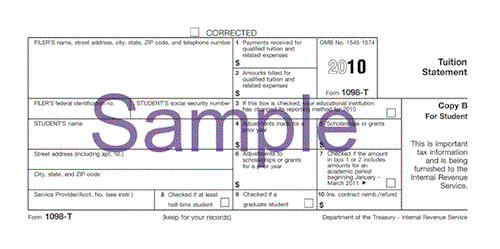Top Stories
Fellowships and grants may seem like free money, but you still have to declare it as Other Income and pay taxes on all or part of the funds. So how do you figure out how much of the money counts as taxable income?
The following tax tips were adapted from the IRS.gov page on Tax Benefits for Education and from information found on H&R Block Scholarship Income .
Do I Have to Pay Taxes on My Fellowship and Grant Money?
Fellowships and grants may seem like free money, but you still have to declare it as Other Income and pay taxes on all or part of the funds. So how do you figure out how much of the money counts as taxable income?
First, you will need your 1098-T (Tuition Statement).
What's the 1098-T (Tuition Statement)?
The 1098-T (Tuition Statement) is a form that tells you how much you received in fellowships and grants (Box 5) and how much you paid the university in qualified education expenses (Box 1 or 2).
How Do You Get a 1098-T?
These forms will be ready by Jan. 23. After that date, go to https://www.1098t.com/ and select "Access My Record".
You will be required to login to a secure portion of the web site to access your individual 1098-T information using your student ID or Social Security Number.
From your student record page, you will be able to print the form by selecting "View My 1098-T Tax Form."

Taxable Income Formula
Once you have the form, use this simple formula to get an approximate idea of what part of your fellowship is taxable. This taxable portion of your fellowship income will count as Other Income for your taxes.
Formula: Box 5 (Scholarships or Grants) - Box 1 or Box 2 (Qualified tuition expenses) = ~Taxable Income.
Your actual taxable income may be higher or lower depending on your situation, so you will need to look at the information below to help you determine the actual amount.
What portion of your scholarship or fellowship is tax free?
Some of your scholarship or fellowship will be tax free if you meet the following conditions:
- You were enrolled for a graduate degree at UCSB (or an eligible institution).
- You used the scholarship or fellowship funds to pay for qualified education expenses.
- The funds did not represent payment for teaching, research, or other services required as a condition for receiving the scholarship.
What Are Qualified Education Expenses?
If you use your fellowship money for certain education expenses, you do not have to pay taxes on that portion or add those amounts to your Other Income.
- Your UCSB tuition and fees (required for enrollment).
- Other course-related expenses, such as fees, books, supplies, and equipment that are required of all students and which you must pay to UCSB. However, if you do not pay UCSB for that book or equipment, it does not count as a tax free expense. (The UCSB bookstore does not count if you buy a required textbook there. The money must be paid to UCSB, say as a fee on BARC).
To qualify, the terms of your scholarship or fellowship cannot require that it be used for other purposes (such as room and board), or specify that it cannot be used for tuition or course-related expenses.
What Education Expenses Must You Pay Taxes On?
Fellowship and Grant money you use to pay the following is taxable and counts toward Other Income:
- Room and board
- Travel
- Research
- Clerical help
- Equipment and other expenses that are not required for enrollment at UCSB.
This is true even if the fee must be paid to the institution as a condition of attendance.
What about health insurance expenses?
Even though we are required to have health insurance, in most cases this expense is not tax free. Therefore, it is not a qualified education expense. However, your situation might be different, so contact the IRS or your tax preparation expert.
To learn more, see the IRS publications page
- Publication 525: Taxable and Nontaxable Income
- Publication 970: Tax Benefits for Education
For other tax tips and resources.
Disclaimer: Neither the Graduate Post nor this funding peer is qualified to advise you on your taxes. For professional help, we suggest you consult a paid or free volunteer tax preparer.